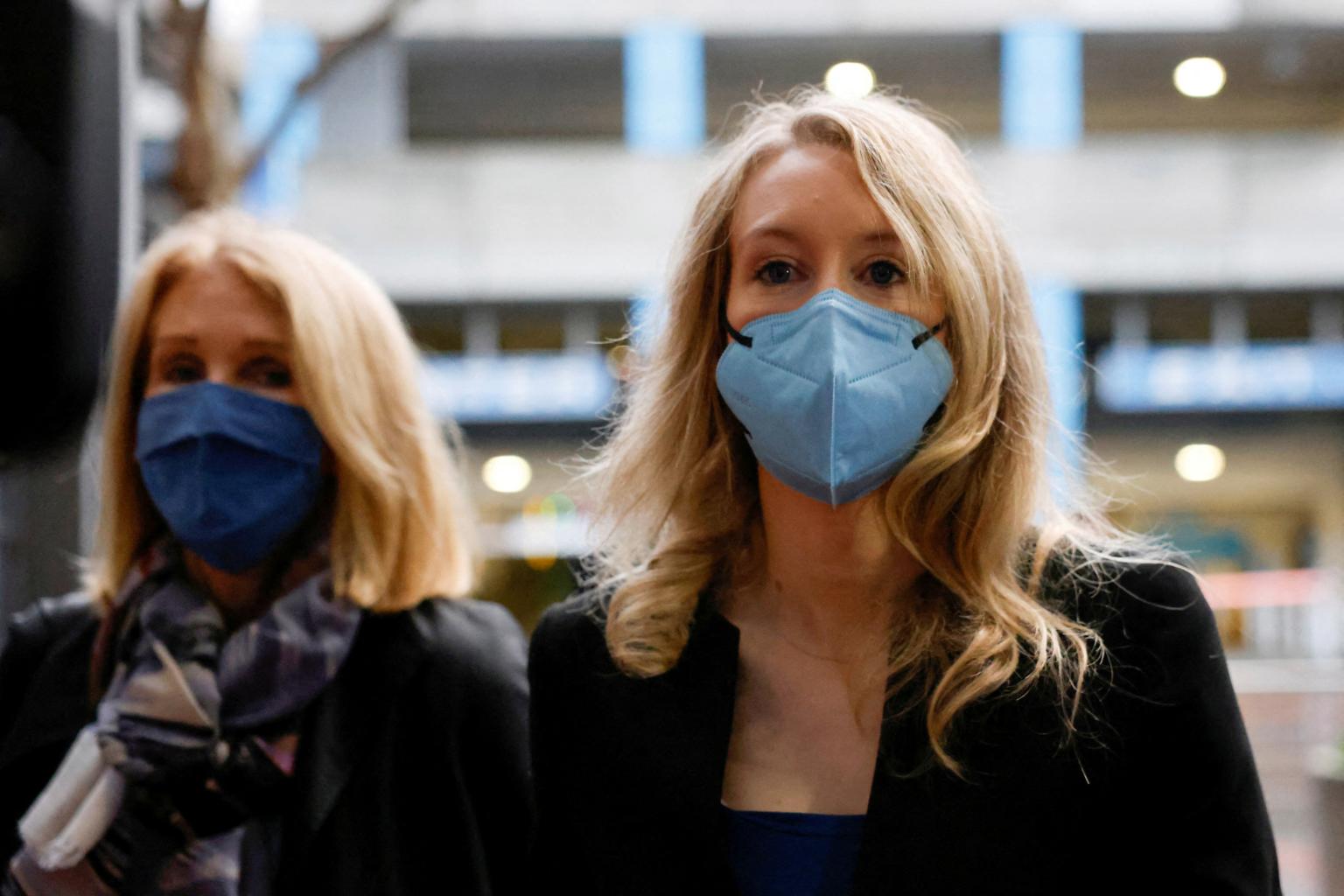Epic rise and fall of Theranos founder Elizabeth Holmes who was convicted of fraud
Sign up now: Get ST's newsletters delivered to your inbox

Theranos founder Elizabeth Holmes arriving at her fraud trial in California on Dec 16, 2021.
PHOTO: REUTERS
SAN FRANCISCO (NYTIMES) - Near the end of Elizabeth Holmes' criminal trial, her lawyers submitted into evidence her punishing self-improvement plan.
"4am. Rise and thank God," the handwritten memo began. Exercise, meditation, prayer, breakfast (whey and, as she spelt it, "bannanna") followed. By 6.45am, a time when slackers were still fumbling for the alarm clock, she was at the office of Theranos, the blood-testing company she founded in 2003.
Holmes, 37, had many rules at Theranos: "I am never a minute late. I show no excitement. ALL ABOUT BUSINESS. I am not impulsive. I know the outcome of every encounter. I do not hesitate. I constantly make decisions and change them as needed. I speak rarely. I call bullshit immediately."
It worked. Holmes' resolve was so forceful and fit so neatly into the Silicon Valley cliche of achieving the impossible by refusing to admit it was impossible, that it inspired belief right up to the moment on Monday when a jury officially convicted her of four counts of fraud.
The verdict signalled the end of an era.
In Silicon Valley, where the line between talk and achievement is often vague, there is finally a limit to faking it.
From Stanford University dropout to Theranos' US$9 billion (S$12.1 billion) valuation to conviction, it is an epic rise and fall that will be chewed over in the cafes and juice bars of Palo Alto, California, until the tech industry departs for a new life in Mr Elon Musk's and Mr Jeff Bezos' off-world colonies.
For a decade, Holmes fooled savvy investors, hundreds of smart employees, an all-star board and a media eager to anoint a new star even, or especially, if she had no qualifications.
Just as Silicon Valley is a cartoonish version of American notions about the virtues of hard work and getting rich quick, so Holmes was a heightened version of Silicon Valley.
As her self-improvement scheme made clear, she was trying to turn herself into a machine that had no time for anything but work. This was not for her own benefit, of course, but humanity's. She perfectly encapsulated the Silicon Valley credo that tech was here to serve us, and never mind exactly how it did it, the billions it was making or whether it even worked.
Whenever anyone - a regulator, an investor, a reporter - wanted to know a little more about exactly how the Theranos machines functioned, the company cried "trade secrets".
Holmes was a natural saleswoman, as good at bending reality as Apple co-founder Steve Jobs himself. Here she was in an interview with the radio show Tech Nation in 2005, explaining what Theranos was all about: "We focused on creating a customised medicine tool that could be used in the home by every patient, so that every day, a patient can get real-time analysis of their blood samples."
Who could not applaud such an invention? Theranos was making a messy, uncertain and time-consuming medical process into something effortless and painless.
"A little teeny needle that pulls a little teeny drop of blood," she said. Software would do the rest.
Tech Nation's host, Moira Gunn, has a master's degree in computer science and a doctor of philosophy in mechanical engineering, but she was dazzled.
"How old are you, Elizabeth?" she asked.
"I'm 21," Holmes said.
Her age was brought up not to knock down her claims but to underline how impressive they were. "I'm gonna go tell my two children, they better get off their duffs," Gunn exclaimed.
Holmes said Theranos' device was in "the production phase". She added, "We hope to release it, actually, to a pharmaceutical partner around mid-to-late this year." Thirteen years later, when the company dissolved, it had never successfully released a device.
Theranos already had the "next generations" of its device in prototype, she said. It was miniaturised to make it even faster, to make it "more high-throughput".
It would be automated: "You don't even have to touch your finger on the device."
So in one of the first media interviews Holmes did, she said Theranos had a working device that would be able to analyse your health without actually touching you. No one called her on it. No wonder she and her deputy and boyfriend, Ramesh Balwani, 56, the company's chief operating officer known as "Sunny", thought they could brazen it out in the Silicon Valley tradition until they had something that actually worked.


